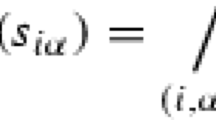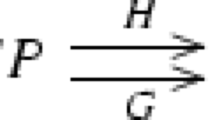Abstract
We introduce the category IE of effect algebras of fuzzy sets and sequentially continuous effect homomorphisms and describe its fundamental properties. We show that IE and the category ID of D-posets of fuzzy sets are isomorphic, hence the constructions and properties of ID related to applications to probability theory are valid for the corresponding effect algebras. We describe basic properties of categorical coproducts in ID and dually of categorical products in the corresponding category MID of measurable spaces. We end with remarks on fuzzy probability notions.
Similar content being viewed by others
References
Adámek J (1982) Mathematical structures and categories. SNTL, Praha
Adámek J (1983) Theory of mathematical structures. Reidel, Dordrecht
Bugajski S (2001a) Statistical maps I. Basic properties. Math Slovaca 51:321–342
Bugajski S (2001b) Statistical maps II. Operational random variables. Math Slovaca 51:343–361
Dvurečenskij A, Pulmannová S (2000) New trends in quantum structures. Kluwer Ister Science, Dordrecht Bratislava
Foulis DJ, Bennett MK (1994) Effect algebras and unsharp quantum logics. Found Phys 24:1331–1352
Frič R (1997) Sequential structures and probability: categorical reflections. In: Porst HE (ed) Mathematik-Arbeitspapiere, vol 48. Universität Bremen, pp 157–169
Frič R (1999) A Stone type duality and its applications to probability. Topol Proc 22:125–137
Frič R (2000a) MV-algebras: convergence and duality. In: Herrlich H, Porst HE (eds) Mathematik-Arbeitspapiere, vol 54. Universität Bremen, pp 169–179
Frič R (2000b) On observables. Int J Theor Phys 39:677–686
Frič R (2002a) Convergence and duality. Appl Categorical Struct 10:257–266
Frič R (2002b) Łukasiewicz tribes are absolutely sequentially closed bold algebras. Czechoslovak Math J 52:861–874
Frič R (2004a) Duality for generalized events. Math Slovaca 54:49–60
Frič R (2004b) Coproducts of D-posets and their applications to probability. Int J Theor Phys 43:1625–1632
Frič R (2005a) Remarks on statistical maps and fuzzy (operational) random variables. Tatra Mt Math Publ 30:21–34
Frič R (2005b) Extension of measures: a categorical approach. Math Bohemica 130:397–407
Gudder S (1998) Fuzzy probability theory. Demonstration Math 31:235–254
Kôpka F, Chovanec F (1994) D-posets. Math Slovaca 44:21–34
Papčo M (2004) On measurable spaces and measurable maps. Tatra Mt Math Publ 28:125–140
Papčo M (2005) On fuzzy random variables: examples and generalizations. Tatra Mt Math Publ 30:175–185
Riečan B, Neubrunn T (1997) Integral, measure, and ordering. Kluwer, Dordrecht
Author information
Authors and Affiliations
Corresponding author
Additional information
Supported by VEGA Grant 1/2002/05.
Rights and permissions
About this article
Cite this article
Papčo, M. On effect algebras of fuzzy sets. Soft Comput 12, 373–379 (2008). https://doi.org/10.1007/s00500-007-0171-1
Published:
Issue Date:
DOI: https://doi.org/10.1007/s00500-007-0171-1
Mathematics Subject Classification (1991)
Keywords
- D-poset
- Effect algebra
- Convergence Sequentially continuous D-homomorphism
- Convergence effect algebra
- Sequentially continuous EA-homomorphism
- D-poset of fuzzy sets
- Pointwise convergence
- ID-poset
- Effect algebra of fuzzy sets
- IE-algebra
- Sober IE-algebra
- Closed IE-algebra
- IE-measurable space
- Measurable map
- Natural equivalence
- Duality
- Monocoreflective subcategory
- Epireflective subcategory
- Product
- Coproduct
- Generalized elementary event
- Generalized measurable space
- Generalized probability measure
- State
- Fuzzy random variable
- Observable




